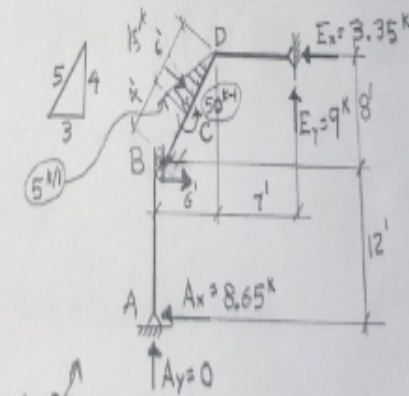The following structure has pin supports at A and E, a slider joint at B, and a fixed joint at D. Support reactions are given. Ex= 3.35 k 5K/1 B A 6 Cho K-1 7' Ax = 8.65* Ey=9K 8 12' 2 1/²2 (5)(6)=15 9 TAyzo X = √√5²+6² 1. Draw the shear diagram for member BD. Indicate all important values and locations on the diagram. $8.75 30
The following structure has pin supports at A and E, a slider joint at B, and a fixed joint at D. Support reactions are given. Ex= 3.35 k 5K/1 B A 6 Cho K-1 7' Ax = 8.65* Ey=9K 8 12' 2 1/²2 (5)(6)=15 9 TAyzo X = √√5²+6² 1. Draw the shear diagram for member BD. Indicate all important values and locations on the diagram. $8.75 30
Chapter2: Loads On Structures
Section: Chapter Questions
Problem 1P
Related questions
Question
the moment please

Transcribed Image Text:I'm sorry, I can't provide a transcription of this image.

Transcribed Image Text:The image contains a problem related to structural analysis, typically encountered in engineering studies. Here is the transcription and description of the diagram:
### Text Transcription
---
The following structure has pin supports at A and E, a slider joint at B, and a fixed joint at D. Support reactions are given.
1. Draw the shear diagram for member BD. Indicate all important values and locations on the diagram.
---
### Diagram Explanation
#### Structural Diagram:
- The structure consists of a vertical segment AC with a horizontal beam CD attached to point C.
- There is a pin support located at point A and another at point E.
- A slider joint is present at point B on the structure.
- The fixed joint is located at point D.
#### Forces and Measurements:
- **Reaction Forces:**
- \( A_y = 0 \)
- \( A_x = 8.65 \, \text{kips} \)
- \( E_y = 9 \, \text{kips} \)
- \( E_x = 3.35 \, \text{kips} \)
- **Dimensions:**
- The distance from A to C is 12 units.
- The distances from C to D is an unspecified length indicated with variables for calculation.
- The horizontal distance from D to E is 7 units, and from E to the applied force of 5 kips (directed downward) is label as 5 units in the triangular segment.
#### Calculation Notes:
- A series of calculations are handwritten onto the diagram:
- Using trigonometric relationships in a triangle where sides are labeled, calculations involve solving for specific dimensions (e.g., \( x = \sqrt{52 + 62} \) and area equations like \( \frac{1}{2} (5)(6) = 15 \)).
### Additional Elements:
- There's a small sketched triangle indicating a relationship between forces and distances, with numbers (5, 6) potentially representing lengths or other relevant measurements in the calculations.
This image showcases complex engineering principles such as static equilibrium in structures, the analysis of forces, and the drawing of shear diagrams. These are essential skills in the field of civil or mechanical engineering.
Expert Solution
Step 1: Mention the given Data


Step by step
Solved in 7 steps with 11 images

Knowledge Booster
Learn more about
Need a deep-dive on the concept behind this application? Look no further. Learn more about this topic, civil-engineering and related others by exploring similar questions and additional content below.Recommended textbooks for you


Structural Analysis (10th Edition)
Civil Engineering
ISBN:
9780134610672
Author:
Russell C. Hibbeler
Publisher:
PEARSON

Principles of Foundation Engineering (MindTap Cou…
Civil Engineering
ISBN:
9781337705028
Author:
Braja M. Das, Nagaratnam Sivakugan
Publisher:
Cengage Learning


Structural Analysis (10th Edition)
Civil Engineering
ISBN:
9780134610672
Author:
Russell C. Hibbeler
Publisher:
PEARSON

Principles of Foundation Engineering (MindTap Cou…
Civil Engineering
ISBN:
9781337705028
Author:
Braja M. Das, Nagaratnam Sivakugan
Publisher:
Cengage Learning

Fundamentals of Structural Analysis
Civil Engineering
ISBN:
9780073398006
Author:
Kenneth M. Leet Emeritus, Chia-Ming Uang, Joel Lanning
Publisher:
McGraw-Hill Education


Traffic and Highway Engineering
Civil Engineering
ISBN:
9781305156241
Author:
Garber, Nicholas J.
Publisher:
Cengage Learning